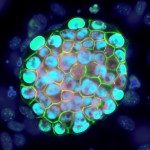Lien vers Pubmed [PMID] – 9809673
Mol. Hum. Reprod. 1998 Oct;4(10):929-38
The emergence of gene inactivation by homologous recombination methodology in embryonic stem cells has revolutionized the field of mouse genetics. Indeed, the availability of a rapidly growing number of mouse null mutants has represented an invaluable source of knowledge on mammalian development, cellular biology and physiology and has provided many models for human inherited diseases. In recent years, improvements of the original ‘knock-out’ strategy, as well as the exploitation of exogenous enzymatic systems that are active in the recombination process, have considerably extended the range of genetic manipulations that can be produced. For example, it is now possible to create a mouse bearing a targeted point mutation as the unique change in its entire genome therefore allowing very fine dissection of gene function in vivo. Chromosome alterations such as large deletions, inversions or translocations can also be designed and will facilitate the global functional analysis of the mouse genome. This will extend the possibilities of creating models of human pathologies that frequently originate from various chromosomal disorders. Finally, the advent of methods allowing conditional gene targeting will open the way for the analysis of the consequence of a particular mutation in a defined organ and at a specific time during the life of a mouse.

